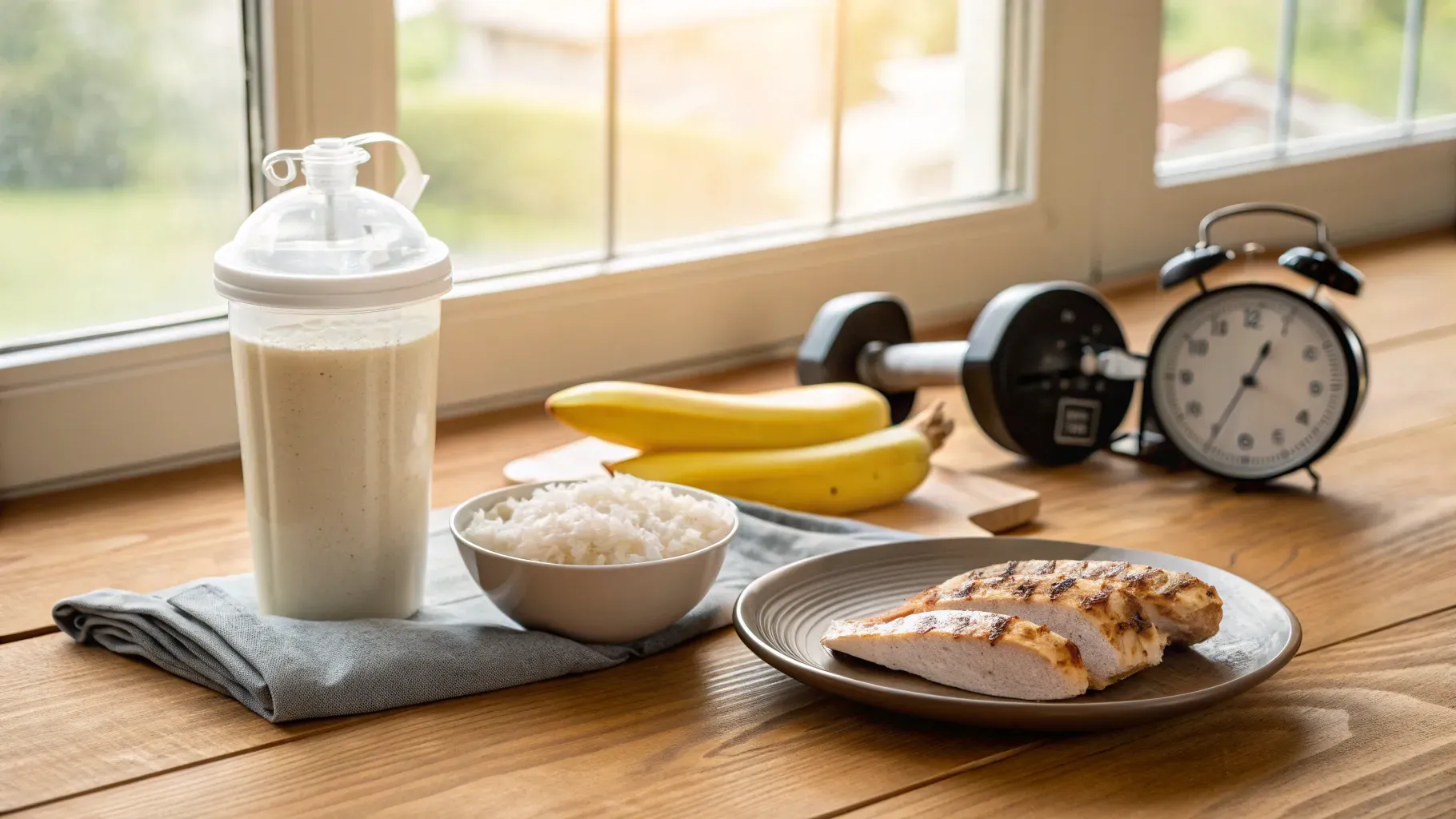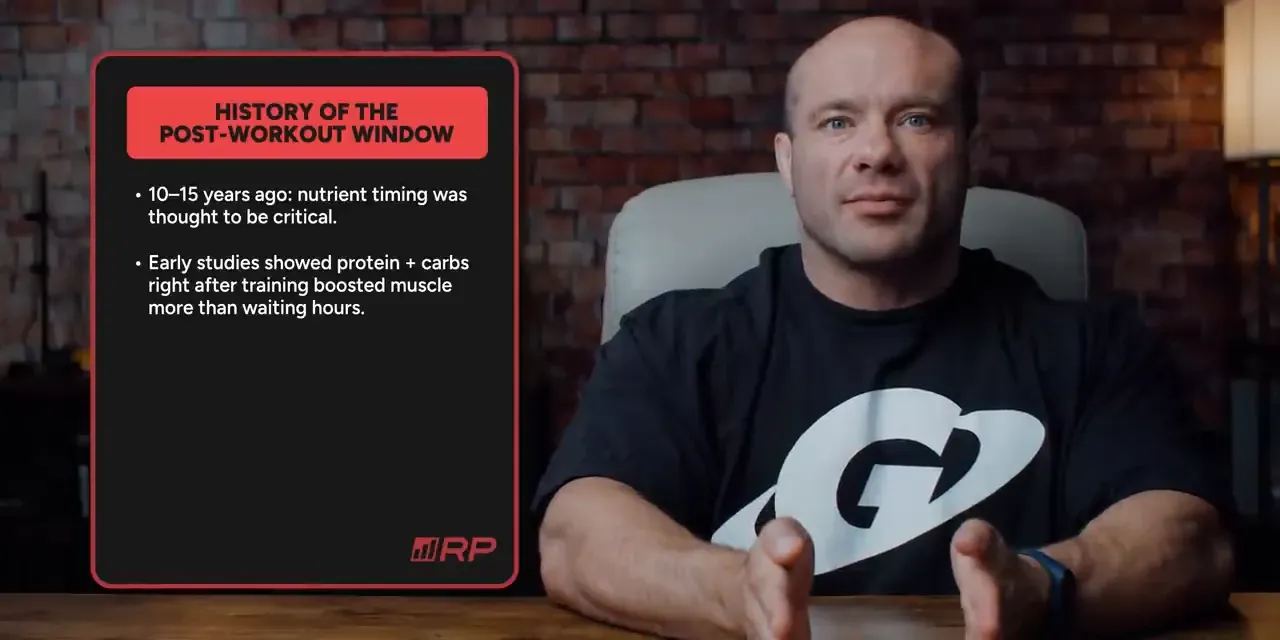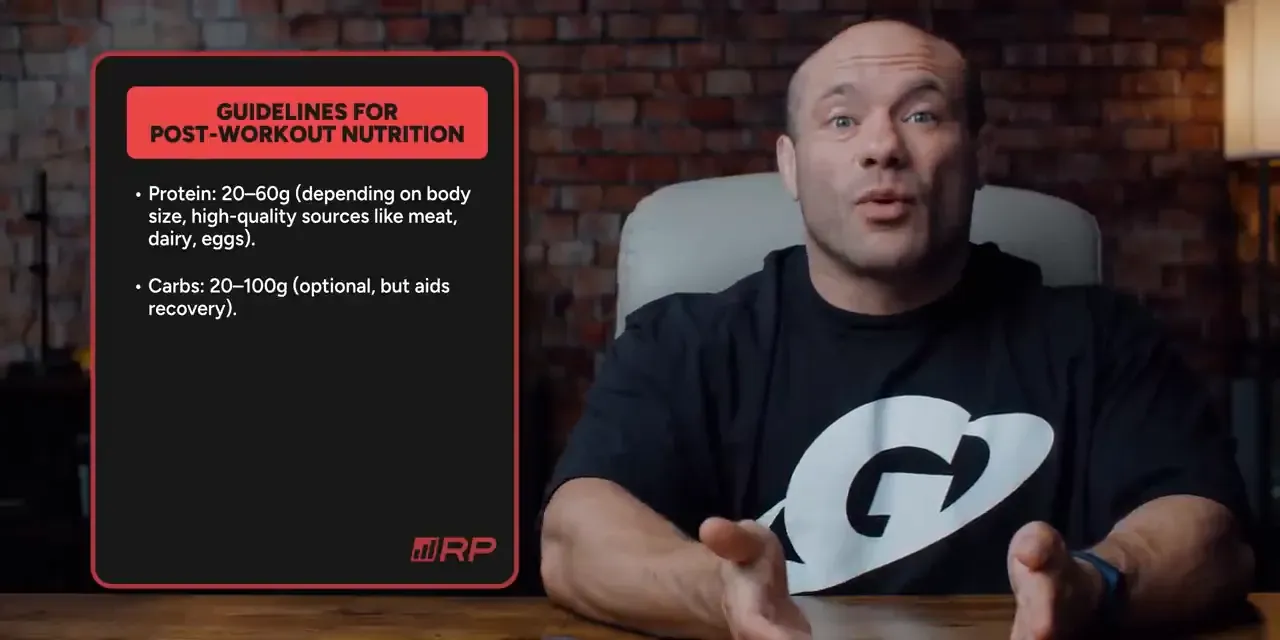Post-Workout Meals: Your Window to More Muscle Gains
Expert-Backed Protein Timing Strategies to Build Muscle and Transform Your Body

Key Takeaways
- You can gain ~95% of the post-workout benefit by hitting total daily protein targets.
- Your post-workout meal within 3 hours adds ~5% more muscle over time—easy to capture.
- You should aim for 20–60g protein + 20–120g carbs post-workout depending on your size.
Try This Today
✔ Within 3 hours of your workout, eat ~40g whey or cooked meat plus 40–60g quick carbs (banana + white rice).
Want to build more muscle and preserve gains by using the post-workout window well?
In this expert review, we analyze, critique, and expand on Renaissance Periodization's practical take on the post-workout meal.
What makes this review different?
- Carefully reviewed and fact-checked by experts
- Little-known tips to squeeze 5% extra growth with minimal effort
Why should you listen to us? Our articles are reviewed by exercise scientists with PhDs from top universities and 60+ years of combined training experience. We combine serious academic credentials with decades of practical training experience to give you science-backed advice you can trust. We've published 300+ articles so far.
Keep reading to get practical rules, meal examples, a simple plan, and expert commentary you can use right away.
Related:
In a Nutshell: Post-Workout Window And Gains
You should aim to hit your daily protein target first. If you do, timing is less critical. Distribute protein across 3–6 meals and you’ll get most gains.
Your post-workout meal still helps. Eating protein and carbs within about three hours gives you a small but real edge. Over months and years that edge compounds.
If you want the next level, use the window. It’s cheap to do. It’s low effort. It stacks with good training, sleep, and consistent calories.
Key Concepts
- Protein Priority: Total daily protein drives most hypertrophy.
- Window Effect: A 3-hour post-workout feeding gives a 3–6 hour sensitivity boost.
- Marginal Gains: Small nutrient timing wins compound for advanced trainees.
Why Timing Once Seemed Critical
Early Studies And The Shake Myth
Years ago, a few clear studies shaped the field. Researchers fed one group protein + carbs right after training. Another group got nothing for hours. The difference was large. The fed group had more muscle growth and less loss.
These results fed a simple idea: the post-workout window mattered a lot. If you eat a precise combo of protein and carbs immediately after training, you will grow more. The message burned into gyms: get that shake now, or suffer.

The Early Paradigm
Books and early guides took those results and ran with them. You learned exact numbers. You learned timing down to minutes. The logic had a face: exercise increases breakdown. Protein and carbs blunt that breakdown. So feed fast.
At the time the advice was defensible. The experimental design seemed simple. But research methods evolved. We learned more about what the early studies really changed.
Confounded Comparisons
Here's the crux. Those early papers often did not hold total daily protein equal. The fed groups simply ate more protein across the day. They also often added calories. So it wasn't just timing. It was total intake.
Once later researchers balanced total protein and calories across groups, the giant timing effects shrank. They didn't vanish, but they dropped to a few percent. That changed how you should think about the window.
Modern Consensus: What Actually Matters
Protein Amount Beats Exact Timing
Fast forward to modern analyses. The big pattern is clear. Give people enough protein across their day and they grow. How you split it matters less. Hit your daily target and distribute it evenly over 3–6 meals and you will get strong hypertrophy signals.
Here’s a simple mental model: protein supply fuels mTOR activation. Exercise provides tension and the mechanical stimulus. Combine both and you get growth. Protein supply across the day keeps amino acids available for mTOR to work on.
Carbs Help By Reducing Breakdown
Carbohydrates add value, mainly by cutting protein breakdown. If you pair carbs with protein after training you reduce the excess catabolism the workout causes. But carbs do not add as much to net synthesis as protein does.
Thus, if you only have room for one change, prioritize protein volume and quality. Carbs are useful. They are not the main driver.
How Much Does Timing Add?
When daily protein is equal, timing accounts for about a 5% difference in outcomes. That 5% is real. It is small in a 12-week study. It is meaningful across years of training.
For a beginner, this 5% is less important. You will grow fast from basic training and daily protein. For an advanced lifter chasing weak gains, that 5% matters. It can be the difference between still improving and plateauing.
Molecular Backing: mTOR And Amino Acids
Molecularly, the mTOR complex sits at the center of growth. Resistance training activates pathways. Amino acids trigger mTOR independently. That means your muscles become more sensitive to amino acids for several hours post-workout.
That sensitive period extends up to six hours, with the first three hours the most responsive. If you send plenty of protein and calories into that window you mildly boost synthesis and blunt breakdown. Over time those small boosts add up.
Practical Rules From Theory And Data
- Priority 1: Hit daily protein (1.6–2.2 g/kg depending on goals and training level).
- Priority 2: Distribute protein evenly across meals (3–6 meals/day).
- Priority 3: Aim for a decent post-workout meal within ~3 hours for hypertrophy sessions.
Why The Window Still Matters
Three points make the window worth your attention:
- Small gains add up across years. A 5% edge compounds.
- Advanced lifters live on margins. When gains slow, timing starts to matter.
- It’s cheap and easy to capture. A banana and a scoop of whey can be enough.

Expert Corner: Proven Strategies & Hidden Gems
Practical Applications
- Short-Term Fix: If you train fasted in the morning, plan at least 20–40g whey within 1–2 hours post-workout to harness early sensitivity.
- Long-Term Gains: If you train in the evening, make your dinner the high-protein post-workout meal to capture the 3-hour window and support overnight recovery.
- Busy Days: Carry a ready mix (whey + carbs) or use low-fat chocolate milk + bagel as a quick post-workout option when you’re rushed.
Examples:
- Example 1: 40g whey + 1 large banana + 60g cooked white rice after a hypertrophy leg session.
- Example 2: Chicken breast + 300g white potato + fruit salad within 2 hours of upper-body training.
Fact-Check Of Key Points
- "Protein + carbs after training reduce breakdown more than they increase synthesis." — Accurate: carbs mainly blunt catabolism; protein drives synthesis.
- "Most timing benefit disappears when total protein is equal." — Accurate: modern controlled comparisons show ~5% residual effect.
- "A sensitive period exists for ~6 hours post-workout, strongest in first 3." — Accurate: mTOR sensitivity wanes but remains elevated for several hours.
- "Advanced lifters benefit more from timing." — Accurate in principle: marginal gains matter more when base gains are small.
More Little-Known Tips For Capturing The Window
- If you train twice a day, aim to have a protein-rich feed between sessions to keep mTOR engaged.
- Use lower-fat protein choices post-workout to speed amino acid appearance. Add fats later in the next meal.
- Sprinkle some fast carbs after very long or glycogen-depleting sessions to support recovery and reduce breakdown.
Common Mistakes With Post-Workout Nutrition & How To Fix Them
- Mistake: Obsessing over an immediate 15-minute window. Fix: Focus on the 3-hour window and total daily protein.
- Mistake: Skipping protein because you don't like shakes. Fix: Use whole-food options—chicken + rice is perfect.
- Mistake: Loading fats into the post-workout meal. Fix: Keep fats moderate to allow faster amino acid delivery.
Science of Post-Workout Nutrition for Muscle Hypertrophy and Fat Loss
Post-workout nutrition plays a key role in optimizing muscle growth (hypertrophy) and supporting fat loss by influencing muscle protein synthesis (MPS), recovery, and metabolic processes. While timing and macronutrient composition are often debated, systematic reviews and meta-analyses have highlighted clear evidence on what strategies are most effective.
Key Findings from Systematic Reviews and Meta-Analyses
- Protein intake post-exercise boosts muscle growth: Consuming protein after resistance training significantly enhances muscle hypertrophy by stimulating MPS, especially when total daily protein intake is adequate (Schoenfeld et al., 2013).
- Carbohydrates post-exercise aren't critical for hypertrophy: Adding carbohydrates to post-workout protein does not significantly increase muscle growth compared to protein alone, though it may help replenish glycogen and reduce muscle soreness (Schoenfeld et al., 2013).
- Total daily intake matters more than timing: The “anabolic window” may be longer than previously thought. Meeting daily protein goals (1.6–2.2 g/kg body weight) is more important than consuming protein immediately post-exercise (Morton et al., 2018).
- Post-workout nutrition may not enhance fat loss directly: There is little direct evidence showing that specific post-exercise nutrition accelerates fat loss, but high-protein diets help preserve muscle mass during caloric deficits, supporting body recomposition (Morton et al., 2018).
Practical Applications of Science
- Consume 20–40g of high-quality protein (e.g. whey) within 2 hours post-workout.
- Prioritize meeting daily protein needs over obsessing about immediate timing.
- For fat loss, pair post-workout protein with a mild caloric deficit and resistance training to maintain muscle.
Scientific Conclusion
Post-workout protein intake supports muscle hypertrophy when total protein intake is sufficient, but does not directly enhance fat loss; timing is helpful but not essential.
My Opinion On Post-Workout Meals
I think the modern view is right. Hit your daily protein first. That is the big lever. You will get most of what matters from that. Over time, small details add up. So don't ignore them.
I also think many people swing too far. Some claim timing is dead. That is an overreaction. The window is not a life-or-death event. It is a margin. But margins matter if you care about the best possible physique.
I like low-effort wins. You can turn a cheap, 5-minute habit into a yearly compounding improvement. If you want more muscle and less fat, the easiest place to start is the post-workout feed. You will get a measurable edge with almost no extra work.
Concluding On Post-Workout Nutrition
The main problem most lifters face is misplaced priorities. They chase tiny hacks and neglect the big drivers: total protein, progressive overload, sleep, and calories. The post-workout meal sits between these extremes. It is small but useful.
Think of your training like driving a car. Total protein and training are the engine and fuel. The post-workout meal is an aerodynamic tweak. It will not add 100 hp. But on a long race, it can shave seconds off your time.
What you stand to gain is clear. A simple habit—one protein feed within ~3 hours—gives a few percent more muscle growth across months and years. If you are advanced, that few percent may be the difference between progress and plateau. If you are new, it helps you learn discipline while you chase larger changes.
Automate the dirty work. Use a coach or an app that builds meals around training. If you want the fastest, simplest automation, try the Dr. Muscle app. It automates nutrition windows and keeps your program on track. Try Dr. Muscle AI—it's free.
FAQ
Do post-workout meals matter?
Post-workout meals matter modestly. If you hit your daily protein and calories, timing becomes less critical. Still, eating a protein-rich meal within 3 hours gives a small but real boost to muscle growth over time.
How much protein should I eat after a workout?
A post-workout protein dose of 20–60 g is effective. Use ~20 g if you are small, ~40 g for average lifters, and ~60 g if you are large or very muscular to maximize leucine and mTOR activation.
Do I need carbs after a workout?
Carbs are useful but not essential for synthesis. They mainly reduce protein breakdown and replenish glycogen. Aim for 20–120 g carbs post-workout depending on session intensity and your body size.
Is the 30-minute anabolic window true?
The strict 30-minute window is overstated. The body is sensitive to amino acids for several hours after training, with the first 3 being most responsive. You do not need to panic if you miss 30 minutes.
What if I train fasted in the morning?
If you train fasted, aim to eat 20–40 g quality protein within 1–2 hours after the session. This helps capture the early sensitivity and reduces muscle protein breakdown.
Does intra-workout nutrition replace the post-workout meal?
Effective intra-workout nutrition (protein + carbs + electrolytes) reduces the urgency of a post-workout meal. It supplies amino acids and carbs during training and shortens the recovery demand afterward.
Should I avoid fats in my post-workout meal?
Don't avoid fats entirely. Keep them moderate to speed protein digestion and amino acid absorption. A lower-fat post-workout meal gets nutrients into your bloodstream faster, which helps early mTOR signaling.
How much does timing affect advanced lifters?
Timing affects advanced lifters more than beginners. Advanced trainees often grow at 5% or less per cycle, so the small gains from good timing compound into measurable progress over months and years.
Can a gas-station snack be a valid post-workout meal?
Yes. A simple combo like low-fat chocolate milk + a bagel or a protein cookie + banana can deliver protein and carbs quickly and effectively. Convenience does not mean poor results.
What is the best single post-workout meal?
There is no single best meal. Practical good choices include whey + rice/banana, chicken + white rice + fruit, Greek yogurt + granola, or lean beef + baked potato. The best meal is one you’ll actually eat within ~3 hours.
Final note
Small, consistent habits add up. A protein-rich meal within ~3 hours of training gives you an easy edge. If you want to automate these routines and keep your nutrition program tight, try Dr. Muscle AI—it's free.
We used AI to summarize the video Do Post-Workout Meals REALLY Matter For Gains? while drafting this expert review.

